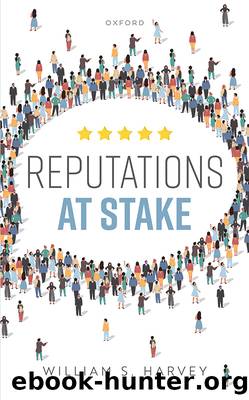Reputations at Stake by Harvey William S.;

Author:Harvey, William S.; [William S. Harvey]
Language: eng
Format: epub
Publisher: Oxford University Press, Incorporated
Published: 2023-02-06T07:15:25+00:00
Note
1 My colleagues and I have defined thought leadership as âKnowledge from a trusted, eminent and authoritative source that is actionable and provides valuable solutions for stakeholdersâ (Harvey et al., 2021d: 11).
9
Doing Well by Doing Good
Health and wellbeing are essential for organizations. When employees are well, happy, and motivated then they will be engaged and productive. When they are unwell, unhappy, and demotivated then they will be disengaged and unproductive at work. Even more pressingly, unhappy employees at work leads to unhappy relationships outside of work, which has negative consequences for them, their families, friends, and wider society. Hence, notwithstanding the economic benefits, first and foremost organizations have a moral duty to look after their people because it is the right thing to do.
There are also reputation benefits from looking after your employees. As I discussed in Chapter 3, the reputation of organizations within the labour market, which includes potential and existing employees, has moral and productivity outcomes for organizations. It is also something that potential and existing employees care about and is therefore being measured and publicly shared. In this chapter, I outline four distinct examples of understanding doing well by doing good. First, I outline the example of Surfwell, an innovative intervention for Devon and Cornwall Police employees to help promote and support their health and wellbeing, in a context where talking about mental health within the UK police force has historically been stigmatized (Tourky et al., 2021). Second, I look at how executive search firms in Australia managed to navigate the common threat of the global financial crisis of 2007â2008. Third, I look at the leadership practices within the principal kingdoms of Nagaland and how a seemingly brutal society of tattoo-faced warriors and headhunters (not executive search firms!) can paradoxically demonstrate lessons of compassion (Featherstone and Harvey, 2021). Fourth, I explore the influence of Daoist nothingness, which focuses on letting go and empowering others rather than instrumental goals and coerciveness, in Chinese leadership practices among small and medium enterprises (SMEs) in Shanghai. These four different illustrations of commitment to the wellbeing of employees, members of the community, and wider stakeholders highlight that there are various ways to support others that are appropriate to the setting.
Download
This site does not store any files on its server. We only index and link to content provided by other sites. Please contact the content providers to delete copyright contents if any and email us, we'll remove relevant links or contents immediately.
Zero to IPO: Over $1 Trillion of Actionable Advice from the World's Most Successful Entrepreneurs by Frederic Kerrest(4135)
Machine Learning at Scale with H2O by Gregory Keys | David Whiting(3847)
Harry Potter and the Goblet Of Fire by J.K. Rowling(3689)
Never by Ken Follett(3649)
Ogilvy on Advertising by David Ogilvy(3424)
Shadow of Night by Deborah Harkness(3234)
The Man Who Died Twice by Richard Osman(2903)
Book of Life by Deborah Harkness(2807)
My Brilliant Friend by Elena Ferrante(2721)
0041152001443424520 .pdf by Unknown(2699)
Will by Will Smith(2692)
How Proust Can Change Your Life by Alain De Botton(2669)
The Tipping Point by Malcolm Gladwell(2587)
Purple Hibiscus by Chimamanda Ngozi Adichie(2536)
How to Pay Zero Taxes, 2018 by Jeff A. Schnepper(2536)
Hooked: A Dark, Contemporary Romance (Never After Series) by Emily McIntire(2449)
Rationality by Steven Pinker(2205)
Borders by unknow(2129)
Daughter of Smoke and Bone by Laini Taylor(2099)
